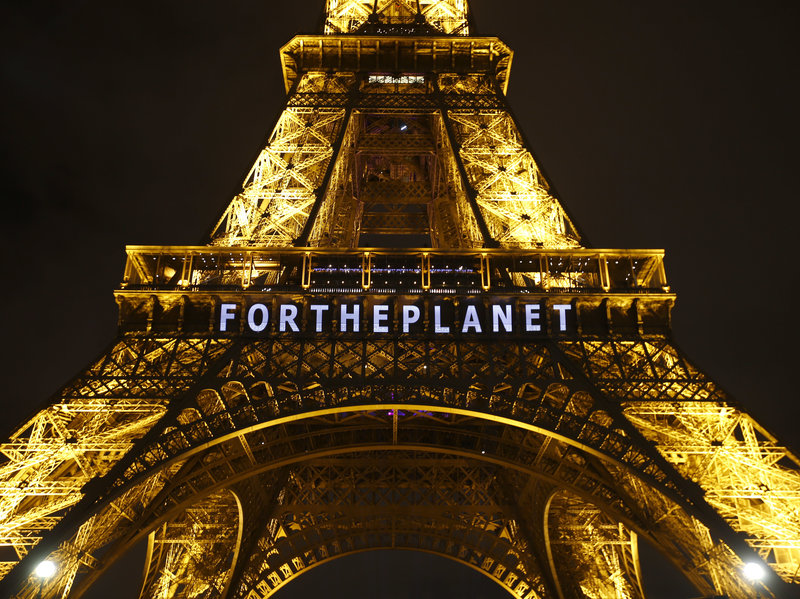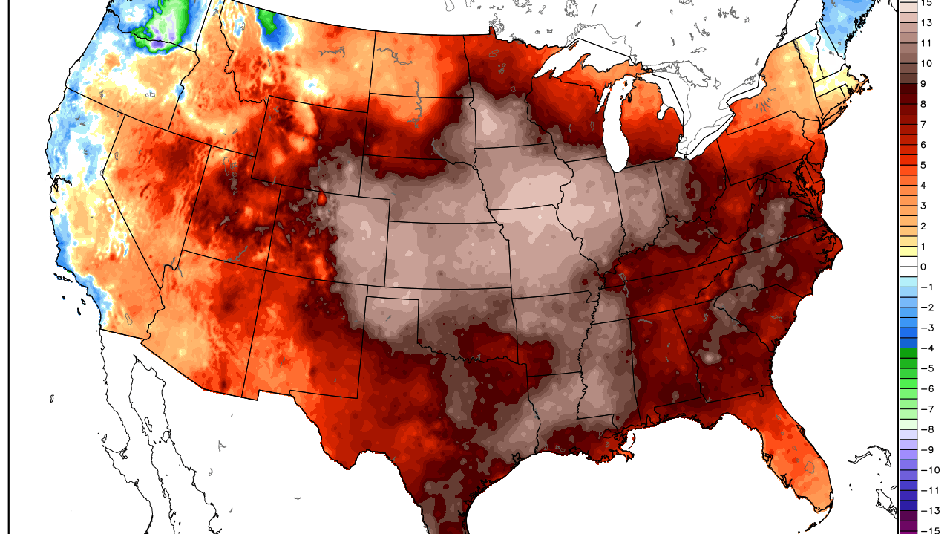From the Editors of Against the Current
June 22, 2017
On a fateful Thursday, June 1, Donald Trump announced that “The United States will withdraw from the Paris climate accord,” setting off alarm bells and outraged protests in U.S. cities and around the world. We would suggest that under present circumstances, he chose the better – well, less bad — of the existing options.

Photo: Francois Mori/AP
To be absolutely clear, we are not adopting a stance of “the worse the better.” Not at all. What socialists and all environmentalists actually want is a U.S. government committed to implementing the inadequate Paris accord, and rapidly surpassing it. It is inadequate, as briefly outlined below — at best an international agreement to begin addressing a climate-change crisis that threatens human civilization. But the kind of U.S. commitment that the situation demands wasn’t on Trump’s desk, or anywhere near his brain.
In announcing U.S. withdrawal, Trump overrode the pleas of his main corporate advisors, including many fossil fuel executives and Secretary of State Rex Tillerson, who argued that “keeping a seat at the table” would enable Washington to obstruct, slow down and sabotage any part of the Paris accord that it deemed damaging to “our economic interests.”
Indeed, as negotiated under president Obama’s leadership the climate accord allowed each country to set its own voluntary carbon-reduction targets, which could be watered down at will. What was to be gained from pulling out, aside from Steve Bannon’s appeal to Trump’s hardcore nationalist supporters, the megabucks pumped in by the Koch brothers, and the applause of coal-country voters who bought Trump’s lies about bringing back the miners’ jobs?
Had Trump followed the stay-and-sabotage course, the result might have been a collective sigh of relief. Instead, four U.S. states – California, New York, Washington and Connecticut – close to 200 cities including the used-to-be coal and steel center Pittsburgh, and scores of academic institutions have been reaffirming their own commitments to the Paris targets.
China, India, Germany, the European Union and many national governments proclaimed that they’re still in – wiping away the fear that U.S. withdrawal from Paris and from the commitment to fund emerging nations’ carbon-reduction efforts would cause the entire accord to unravel. Arguably, in making the United States a climate-change pariah, Trump has succeeded in strengthening the global commitment to the accord and support for it in the U.S. population. So he may have struck at least a small blow for the environment.
Of course, the environmental movement can have no confidence that capitalist governments, which answer to their own ruling classes, can or will make the urgent transition to a renewable-energy global economy work. Of course, Paris itself is inadequate.

Image: Weatherbell Analytics
Consider that climate scientists are almost unanimous that a two-degree Celsius (3.6 degrees Fahrenheit) increase in global temperature over mid-19th century levels is the outer limit of what civilization is likely to survive; that a much safer goal is to hold global warming to 1.5 degrees C, and that very close to one degree C has already occurred. Now consider this: “Under the Paris deal, countries submitted voluntary pledges that, various analyses have found, would put the world on pace for three degrees [5.4 degrees F] of warming” — which is in catastrophic bordering on apocalyptic territory.
The hope must be that starting the global carbon-reduction process will create accelerating momentum that by mid-century could brings the two or 1.5 degree target within range. The justification for Paris is the gamble that it sets only the floor, not the ceiling, of a sustainability revolution that must be accomplished — through the combination of political will, technical innovation, investment in renewable energy, and above all profound changes in social relations and our collective understanding of how to live full and meaningful lives.
Donald Trump, on the other hand, looks to the most advanced technology – of the 19th century– when coal fueled the industrial transformation of human life. His blustering pronouncements that Barack Obama’s policies waged a “war on coal” has only one, unintentional, element of truth. What‘s killed off an already declining U.S. coal industry isn’t really regulation, but the spectacular growth of natural gas and shale oil production, primarily through hydraulic fracturing (fracking) during the Obama administration.
In 2012 alone, this technology produced 280 billion gallons of wastewater in ten U.S. states (see the extensive report “Fracking by the Numbers.” In a strange dialectical quest, the dirtiest fossil-fuel industry has effectively been supplanted by a technology that is itself destructive, a massive threat to clean water supplies and the global environment, and must be replaced as rapidly as possible.
But the fear and loathing created by Trump’s sneering withdrawal from the climate accord – instead of staying to kill it from within – may have moved the needle in an important positive direction. For the first time, mainstream media are picking up what experts and environmentalists have said for years, that a transition away from fossil fuels will create more and better jobs than those lost, and that rural and coal-country America will share the benefits. — along with those many nations whose physical existence depends on ending capital’s war on nature.
In the end, if civilization survives and future historians exist to tell the tale, they might offer up a muffled half-cheer for Donald Trump, for helping to bring the world face to face with its real condition.
This editorial will appear in the July/August edition of Against the Current.

Comments
3 responses to “One-Half Cheer for Trump on the Climate?”
Пробив Почта Банк – узнать дату рождения человека по паспортным данным, поиск данных должника
Yes, Trump withdrew, which was good for the reasons given. But capital has not withdrawn from the international battle. As in the last several international meetings, they will be there in full force, U.S. and multinational. The governments negotiating agreements (and also the U.S progressive cities and states participating in some capacity) will continue to seek counsel and cooperation from them.
Complicating the struggle, capital is not united. Fossil fuel interests are working to slow things down and gain approval for publicly funded research on clean coal or carbon sequestration. But other industries are showing considerable capacity to adapt to the climate crisis, which makes them increasingly confident about powering their whole operation mostly on solar and wind. The Investor Owned Utilities, Big Finance, the investment “community,” the growing clean energy industries, and publicly subsidized engineering and other laboratories across the planet are trying to make that happen. And if the climate scientists are wrong by a degree or two, if they have slightly over estimated the threat, if the planet has more than 60 years or so to adapt, capital might succeed in maintaining their system with solar and wind power which would give greater life to capital and its constitutional imperative, to grow or die.
But of course “exponential growth is the creed of the cancer cell.” Degradation of soils and waters, extinction of species, creation of ever new and more powerful pathogens, the chemical time bomb, exhaustion of resources, wars for booty — all would continue.
Right now the left is weak but several technological and political developments are favorable. The radical and democratic left could play an important role in maximizing community ownership and control of renewable energy production and distribution. These local organizations and grassroots forces, confederated nationally and across the planet, are capable of prevailing over a xenophobic authoritarian corporate right that will also be contesting for power whenever the system comes into some combined economic/ecological crisis.
There is nothing like a deserter to unite the remaining soldiers…
What was missed it the money lies in the development of green power, which would actually create more jobs for all the people the president vowed to keep above the poverty line. The motives for this cannot only be in the interest of the american people as many of these aims can be aligned with growth, but need to have the message and implementation shaped for this.
While this doesnt mean America wont do anything, it does mean that it stands alone in regards to clmate change in whatever it chooses to do.
This on line canadian website offers the most useful slot machine games around along with this downloadable on line casino site that provides far more variety of { online gambling games.